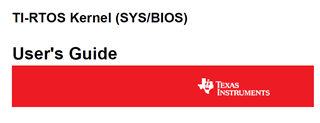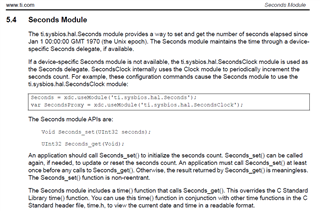Other Parts Discussed in Thread: SYSBIOS
I am trying to configure the RTC to generate an interrupt based on the "hour changed" event. I can get "minute changed" to work fine. However, when I try "hour changed" I see that the RTCTEVx field gets overwritten in the tirtos/packages/ti/sysbios/family/arm/msp432/Seconds.c Seconds_set() function. This seems like a bug. If not, how can I configure for RTCTEVx = 01b and still use clock_settime() (which ultimately calls Seconds_set())?
//MAP_RTC_C_setCalendarEvent(RTC_C_CALENDAREVENT_HOURCHANGE); /* does not work after call to Seconds_set() */
MAP_RTC_C_setCalendarEvent(RTC_C_CALENDAREVENT_MINUTECHANGE);
MAP_RTC_C_clearInterruptFlag(RTC_C_TIME_EVENT_INTERRUPT);
MAP_RTC_C_enableInterrupt(RTC_C_TIME_EVENT_INTERRUPT);





